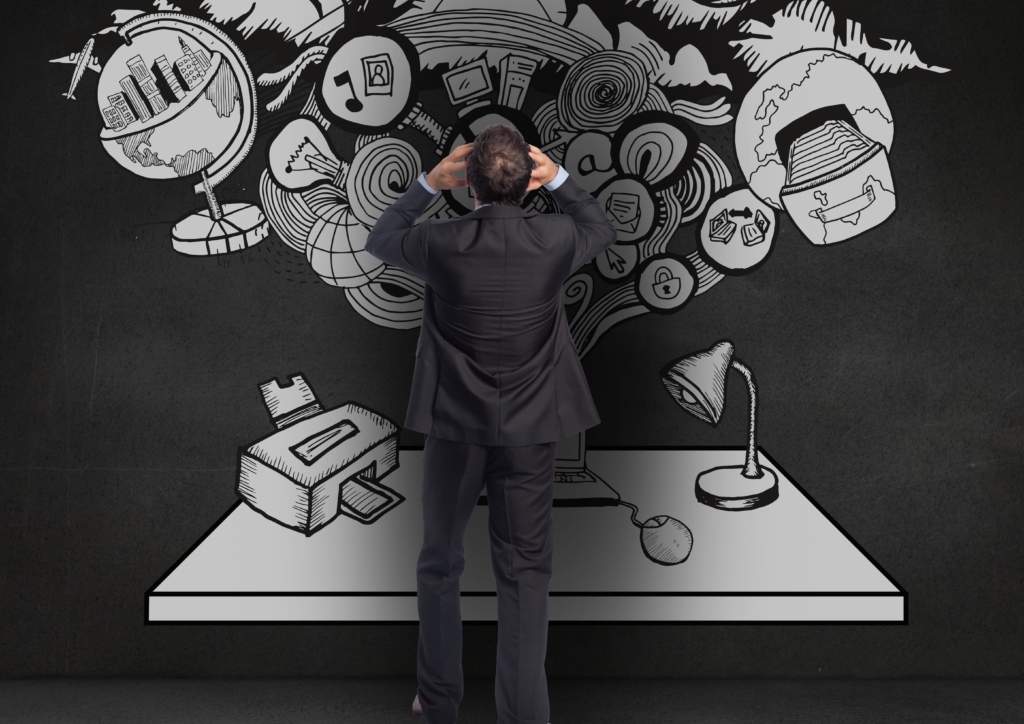152Views 0Comments
Understanding Paradigms: The Key to Unlocking Your Potential

Have you heard the term ‘paradigm’ and wondered what its definition really was? In this blog post, we will discuss paradigms and how they affect our behaviors and limit our potential. Join us as we embark on this voyage of self-discovery and learn how to break free from any restrictions your current paradigm imposes upon your life.
What Is a Paradigm?

A paradigm refers to a multitude of habits that control our behaviour, which operate within our subconscious minds through programming. Paradigms result from both environmental factors and genetic makeup.
Habits Are Deep-Seeded
Habits may come to mind as something we do on an everyday basis; however, patterns extend much further than this. They influence not only our actions but also our thoughts and beliefs – these habits become embedded deep within our subconscious minds, known as paradigms.
Example : If we grew up in a pessimistic environment where negativity is the norm, our paradigm may include negative thought patterns and beliefs that influence how we view the world and react to various situations. These inculcated habits determine our outlook and responses in different circumstances.
Formed through Programming
Our paradigms don’t form just by themselves; they develop through programming. From early childhood onwards, external influences such as our parents, teachers, friends, and media have an immense effect on shaping our minds – both positive and negative influences play an essential part in creating our paradigms.
If we were constantly praised for our achievements and made to feel that anything is possible if we put our mind to it, our paradigm would include positive beliefs about ourselves and our abilities. Conversely, if we were constantly criticised and made inadequate by others, our paradigm could become clouded with self-doubt and restrictive thoughts.
Product of Environment and Genetic Makeup
Both environmental factors and genetic makeup contribute to our paradigms. Family, culture, and socio-economic status all play an integral part in moulding our beliefs and values – thus impacting how we develop habits and perceive the world.
Additionally, our genetic makeup can incline us toward certain paradigms; for instance, some individuals may be predisposed to anxiety or depression due to genetic influences; this could alter their life views and how they navigate it.

Changing Paradigms
While our paradigms may be deeply entrenched, they’re not set in stone. Through awareness and deliberate effort, it is possible to alter our paradigms and develop healthier, empowering habits.
Change requires us to identify our limiting beliefs and thought patterns that hold us back and then replace them with positive habits through repetition and consistent practice.
Rewiring our subconscious minds may not be simple, but it is necessary for personal development and transformation. We can escape self-imposed limitations by shifting paradigms and tap into our true potential.
Paradigms are habits that guide our behaviour, created through subconscious programming influenced by environment and genetic makeup. But paradigms don’t need to remain permanent: with awareness and deliberate effort, we can transform them and form new empowering habits for more incredible personal growth and success.
The Impact of Paradigms
A paradigm can be defined as any mental framework or set of beliefs and assumptions that dictate our perception and interpretation of reality. Paradigms play an outsized role in our lives, impacting choices, actions, success or failure – even among people of intelligence who seem wise enough. We will examine their effects here by exploring why brilliant people make dumb choices, influence career options, and financial success decisions, and ultimately limit potential by keeping us stuck within our comfort zones.
Why do smart people make poor choices?

At times, it can be surprising to witness intelligent and talented individuals making seemingly irrational or counterproductive decisions, yet their reasoning can often be explained by the paradigms they hold. Paradigms affect how we think and perceive information; sometimes, this leads us to make choices based on outdated or flawed beliefs.
For example, an entrepreneur with a fixed mindset might avoid taking risks and exploring new opportunities out of fear of failure and change. Such an individual might avoid adapting to market trends or making innovative decisions that could contribute to their ultimate success.
By understanding and challenging our paradigms, we can avoid making poor choices. Expanding our minds to accept new perspectives may improve decision-making and growth.
The influence of paradigms on career choices and financial success

Paradigms play an enormously consequential role in our career decisions and financial success. They determine our beliefs about what is feasible or unfeasible, shaping both paths chosen to pursue and any risks we are willing to take.
For instance, someone with a narrow paradigm who believes success can only be obtained through traditional careers may be less inclined to explore entrepreneurial opportunities or follow unconventional paths that could open them up to financial success and personal fulfilment. Such thinking limits their chances for economic prosperity as well as personal fulfilment.
However, individuals with growth-oriented paradigms embrace new challenges with open arms and take calculated risks that test their capabilities. They remain open to continuous learning and different career paths that could yield more significant financial gains and professional fulfilment.
Paradigms and the limitation of potential
One of the most significant impacts of paradigms is their capacity to restrict our growth and keep us within our comfort zones. They create mental boundaries that dictate what we believe is possible for ourselves, limiting any opportunity for personal or professional advancement.
Example: Someone with a fixed mindset paradigm who believes their intelligence and abilities are set can be reluctant to accept challenges that require stepping outside their comfort zone for fear of failure and believing they cannot achieve growth, thus hindering their full potential from emerging.
By acknowledging and challenging these limiting paradigms, individuals can escape their comfort zones and access new levels of growth and success. Adopting a growth mindset gives us confidence in our ability to learn and develop, encouraging us to pursue challenges and reach greater heights.
Paradigms play an inescapable role in our lives; they influence our thinking, shape our decisions, and ultimately determine our success or failure. By understanding and challenging these paradigms, we can break free from limitations, make wiser choices, and reach our full potential.
The Role of Education

Educational systems worldwide tend to focus on instilling intellectual knowledge, such as mathematics and sciences, history, and literature, into students. Students learn information in these subjects while developing logic and analytic abilities. While this approach has its merits, it often misses a critical component of education – paradigms.
Schools focus on intellectual knowledge, not paradigms.
Paradigms are the core beliefs, assumptions, and values that shape our worldview and guide our behaviour. They form the mental frameworks through which we interpret and respond to the world around us – yet traditional education often overlooks this aspect.
Learners are instead encouraged to memorise facts and formulas without questioning their context or validity; while the goal may be developing critical thinking and problem-solving abilities, without considering how paradigms influence our choices and actions, we are restricting the true potential of education.
Consider, for example, a student studying history. While they may acquire knowledge about significant events and timelines without fully addressing biases that shape how these facts are presented to us and without engaging with diverse paradigms and worldview, they limit their learning opportunities to one singular narrative and miss out on crucial learning opportunities associated with understanding different points of view.
We graduate with intellectual skills but lack behavioral change
Students progressing through education systems tend to prioritise intellectual growth; they gain knowledge and skills intended to equip them for higher education or employment; however, this approach often fails at translating knowledge into lasting behavioural change.
Though they possess many intellectual skills, many individuals struggle to apply them effectively in real-life scenarios due to education’s neglect of developing self-awareness and emotional intelligence – factors essential for driving positive behavioural change.
By incorporating an understanding of paradigms into education, we can bridge this divide and help students develop not only intellectual but also emotional intelligence to navigate interpersonal relationships and make ethical decisions that benefit society as a whole.
Understanding paradigms is the missing piece in our education system
Paradigm shifts have long been at the core of societal progress and innovation. From the Copernican revolution in astronomy to technological innovations, challenges to existing paradigms drive change that propels us forward and pushes society forward.
Establishing an understanding of paradigms in our education systems is vital in cultivating a generation of critical thinkers, change-makers, and empathic individuals. Encouraging students to examine their underlying beliefs and assumptions enables them to challenge the status quo, think independently, and contribute positively towards positive societal transformation.
Schools must provide opportunities for students to explore diverse perspectives and engage in critical dialogue. By including interdisciplinary studies, ethics, philosophy, and cultural studies in their curriculums, schools can create an education system that imparts intellectual knowledge and equips students with tools for navigating modern society’s complexities.
Now is the time to recognise that holistic education requires nurturing intellect and individual’s ability to comprehend and navigate paradigms. Through adopting an interdisciplinary paradigm-centric approach, we can equip learners not only academically but also build a more equitable, compassionate, and sustainable global society.
Breaking Free of Paradigms

Breaking free from paradigms is no simple feat, requiring conscious effort, awareness, and an unyielding passion for change. Paradigms are mental frameworks that form our thoughts, beliefs, actions, perceptions of life’s events, decisions about the world we inhabit, and limits that prevent us from realising our full potential.
Change requires us to step outside our comfort zones and overcome what’s known as the terror barrier – the fear and resistance experienced when trying to break free from old ways of thinking and doing things; it is a natural response to the unknown and uncertainty brought on by change.
Reducing terror begins with awareness. We must first become conscious of our current paradigms and their limitations on us; this involves honest self-reflection, challenging beliefs and assumptions we hold about ourselves, and welcoming new ideas and possibilities.
Once we become conscious of our paradigms, we can start actively shifting them. The Proctor Gallagher Institute provides tools and techniques designed to facilitate a conscious paradigm shift. These are intended to assist individuals in identifying old paradigms they may no longer wish to keep and replacing them with more positive, empowering ones.
Conscious Effort and Awareness Are Essential
Change requires conscious effort and awareness; being present in each moment while paying close attention to our thoughts, beliefs, and actions requires a commitment to self-improvement as well as a willingness to do the inner work necessary for change.
Meditation can be an effective method for increasing conscious awareness. Meditation helps quiet the mind, creating space for new insights and perspectives to emerge while cultivating inner peace and calm – attributes supporting paradigm shift processes.
Journaling can be an effective means of developing conscious awareness. Through writing down our thoughts and emotions, journaling offers us clarity into our perspectives. Additionally, journaling helps identify any patterns or recurring themes that may be inhibiting us. Journaling also serves as a safe space for exploration and self-expression.
Overcoming Terror Barrier
Sometimes, breaking free from paradigms requires facing our terror barrier head-on with courage and resilience. At that point, old paradigms collide with what we’re trying to create new paradigms.
Visualisation can help us overcome terror barriers. We can build confidence and lower fear by visualising ourselves successfully navigating past these hurdles and accepting the new paradigm. Visualisation also reprograms our subconscious mind and forms neural pathways that support change.
Another technique is taking small, incremental steps toward the new paradigm. By gradually exposing ourselves to it, we can build confidence and reduce resistance – ultimately helping us adjust to change more efficiently and increase comfort levels over time.
Transformation with Lasting Results
One key to successfully changing our lives and realising long-term transformation is shifting paradigms – mental frameworks that influence our thoughts, beliefs, and actions – which shape how we think, feel, and act. Shifting these paradigms can unlock our full potential and allow us to craft the lives we envision for ourselves. At Proctor Gallagher Institute, they specialise in this transformative process for individuals.
The Proctor Gallagher Institute understands that long-term change does not occur overnight but requires an in-depth knowledge of our paradigms and a determination to shift them. With their cutting-edge programs and resources, they guide individuals toward personal development and success.
Paradigm Shift
A paradigm shift is any significant alteration in our understanding and perspective of life. This often includes questioning long-held beliefs and opening ourselves up to new possibilities. This act allows us to break free from self-imposed limitations and realise our true potential.
Change our paradigms, and you change how we think, feel, and act. Your mindset shifts from scarcity to abundance, fear to confidence, limitation to possibility – opening up a world of opportunities and empowering you to achieve extraordinary results.
The Role of the Proctor Gallagher Institute
Founded by internationally acclaimed speaker and success coach Bob Proctor and his business partner Sandy Gallagher, the Proctor Gallagher Institute specialises in teaching individuals how to shift their paradigms for lasting results.
The Institute offers programs and resources designed to aid personal growth and development, including online courses, live events, coaching programs, and an abundance of educational materials. Their teachings draw from decades of research and experience in neuroscience, psychology, and personal development.
Proctor Gallagher Institute helps individuals identify and overcome limiting paradigms that keep them from reaching their goals. Through their programs, the Institute equips individuals with tools and strategies for changing their mindset to take inspired steps toward their desired results.
At the Proctor Gallagher Institute, our philosophy rests on the idea that everyone possesses unlimited potential. By shifting our paradigms and aligning our thoughts, beliefs, and actions with this belief system, we can tap into that potential and create the life we envision for ourselves.
Striking lasting results requires dedication, persistence, and an openness to venture outside our comfort zones. At Proctor Gallagher Institute, we can provide the guidance and support needed for this transformative journey through their transformative programs, which equip individuals with the tools necessary to break free from patterns that no longer serve them and produce extraordinary results in all areas of their lives.
Conclusion
Shifting paradigms and taking inspired action towards our goals can transform our lives and achieve lasting change. At Proctor Gallagher Institute, they specialize in supporting individuals in this transformation process by offering programs designed to shift mindsets and inspire action toward your desired outcomes. Unlock your potential with their help and create the life you’ve always imagined with Proctor Gallagher Institute!


